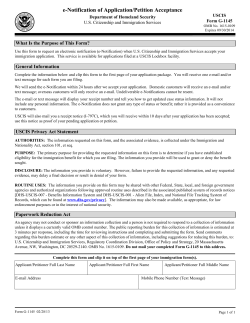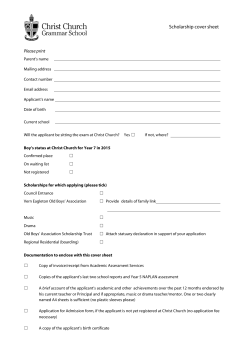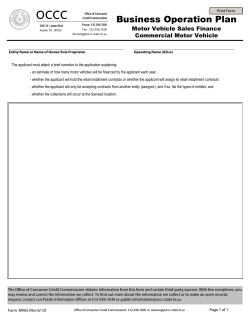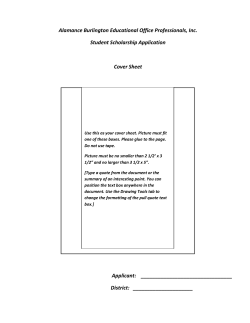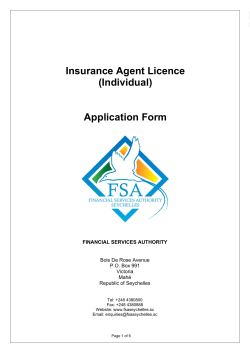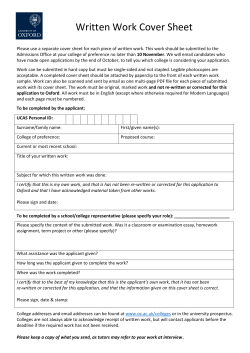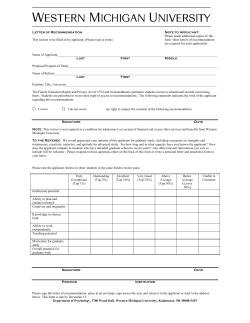
64305 Federal Register
Federal Register / Vol. 79, No. 209 / Wednesday, October 29, 2014 / Rules and Regulations Authority: 5 U.S.C. 301, 552, 552a; 8 U.S.C. 1101, 1103, 1304, 1356, 1356b; 31 U.S.C. 9701; Public Law 107–296, 116 Stat. 2135 (6 U.S.C. 1 et seq.); E.O. 12356, 47 FR 14874, 15557, 3 CFR, 1982 Comp., p. 166; 8 CFR part 2; Pub. L. 112–54. Subpart A—Applying for Benefits, Surety Bonds, Fees 2. Section 103.2(b)(19) is revised to read as follows: ■ § 103.2 Submission and adjudication of benefit requests. rmajette on DSK2TPTVN1PROD with RULES * * * * * (b) * * * (19) Notification. (i) Unrepresented applicants or petitioners. USCIS will only send original notices and documents evidencing lawful status based on the approval of a benefit request directly to the applicant or petitioner if the applicant or petitioner is not represented. (ii) Represented applicants or petitioners. (A) Notices. When an applicant or petitioner is represented, USCIS will send original notices both to the applicant or petitioner and his or her authorized attorney or accredited representative. If provided in this title, on the applicable form, or on form instructions, an applicant or petitioner filing a paper application or petition may request that all original notices, such as requests for evidence and notices of decision, only be sent to the official business address of the applicant’s or petitioner’s authorized attorney or accredited representative, as reflected on a properly executed Notice of Entry of Appearance as Attorney or Accredited Representative. In such instances, a courtesy copy of the original notice will be sent to the applicant or petitioner. (B) Electronic notices. For applications or petitions filed electronically, USCIS will notify both the applicant or petitioner and the authorized attorney or accredited representative electronically of any notices or decisions. Except as provided in paragraph (b)(19)(ii)(C) of this section, USCIS will not issue paper notices or decisions for electronicallyfiled applications or petitions, unless: (1) The option exists for the applicant or petitioner to request to receive paper notices or decisions by mail through the U.S. Postal Service, by indicating this preference in his or her electronic online account profile in USCIS’s electronic immigration system; or (2) USCIS, in its discretion, determines that issuing a paper notice or decision for an electronically-filed application or petition is warranted. VerDate Sep<11>2014 13:58 Oct 28, 2014 Jkt 235001 (C) Approval notices with attached Arrival-Departure Records. USCIS will send an original paper approval notice with an attached Arrival-Departure Record, reflecting USCIS’s approval of an applicant’s request for an extension of stay or change of status, to the official business address of the applicant’s or petitioner’s attorney or accredited representative, as reflected on a properly executed Notice of Entry of Appearance as Attorney or Accredited Representative or in the address section of the online representative account profile in USCIS’s electronic immigration system, unless the applicant specifically requests that the original approval notice with an attached Arrival-Departure Record be sent directly to his or her mailing address. (iii) Secure identity documents. USCIS will send secure identification documents, such as a Permanent Resident Card or Employment Authorization Document, only to the applicant or self-petitioner unless the applicant or self-petitioner specifically consents to having his or her secure identification document sent to the official business address of the applicant’s or self-petitioner’s attorney of record or accredited representative, as reflected on a properly executed Notice of Entry of Appearance as Attorney or Accredited Representative or in the address section of the online representative account profile in USCIS’s electronic immigration system. * * * * * Jeh Charles Johnson, Secretary. [FR Doc. 2014–25622 Filed 10–28–14; 8:45 am] BILLING CODE 9111–97–P DEPARTMENT OF TRANSPORTATION Federal Aviation Administration 14 CFR Part 39 [Docket No. FAA–2014–0285; Directorate Identifier 2014–NM–035–AD; Amendment 39–17990; AD 2012–26–15 R1] RIN 2120–AA64 Airworthiness Directives; Honeywell International Inc. Air Data Pressure Transducers Federal Aviation Administration (FAA), Department of Transportation (DOT). ACTION: Final rule; removal. AGENCY: We are removing Airworthiness Directive (AD) 2012–26– SUMMARY: PO 00000 Frm 00009 Fmt 4700 Sfmt 4700 64305 15, which applied to certain Honeywell International Inc. air data pressure transducers as installed on various aircraft. AD 2012–26–15 required doing various tests or checks of equipment having certain air data pressure transducers, removing equipment if necessary, and reporting the results of the tests or checks. As an option to the tests or checks, AD 2012–26–15 allowed removal of affected equipment having certain air data pressure transducers. We issued AD 2012–26–15 to detect and correct inaccuracies of the pressure sensors, which could result in altitude, computed airspeed, true airspeed, and Mach computation errors. AD 2012–26– 15 reported that these errors could reduce the ability of the flightcrew to maintain the safe flight of the aircraft and could result in consequent loss of control of the aircraft. Since we issued AD 2012–26–15, we have received new data indicating that the safety risk is lower than originally estimated. DATES: This AD becomes effective December 3, 2014. ADDRESSES: You may examine the AD docket on the Internet at http:// www.regulations.gov/ #!docketDetail;D=FAA-2014-0285; or in person at the Docket Management Facility, U.S. Department of Transportation, Docket Operations, M– 30, West Building Ground Floor, Room W12–140, 1200 New Jersey Avenue SE., Washington, DC. FOR FURTHER INFORMATION CONTACT: Sreekant Sarma, Aerospace Engineer, Systems and Equipment Branch, ANM– 130L, FAA, Los Angeles Aircraft Certification Office, 3960 Paramount Boulevard, Lakewood, CA 90712–4137; phone: 562–627–5351; fax: 562–627– 5210; email: sreekant.sarma@faa.gov. SUPPLEMENTARY INFORMATION: Discussion We issued a notice of proposed rulemaking (NPRM) to amend 14 CFR part 39 by adding an AD that would apply to certain Honeywell International Inc. air data pressure transducers as installed on various aircraft. The NPRM published in the Federal Register on May 28, 2014 (79 FR 30498). The NPRM was prompted by new data indicating that the safety risk is lower than originally estimated. The NPRM proposed to remove AD 2012– 26–15, Amendment 39–17310 (78 FR 1735, January 9, 2013). Comments We gave the public the opportunity to participate in developing this AD. We considered the comment received. E:\FR\FM\29OCR1.SGM 29OCR1 64306 Federal Register / Vol. 79, No. 209 / Wednesday, October 29, 2014 / Rules and Regulations Boeing concurred with the NPRM (79 FR 30498, May 28, 2014). Conclusion We reviewed the available data, including the comment received, and determined that air safety and the public interest require adopting this AD as proposed except for minor editorial changes. We have determined that these minor changes: • Are consistent with the intent that was proposed in the NPRM (79 FR 30498, May 28, 2014); and • Do not add any additional burden upon the public than was already proposed in the NPRM (79 FR 30498, May 28, 2014). Authority for This Rulemaking Title 49 of the United States Code specifies the FAA’s authority to issue rules on aviation safety. Subtitle I, section 106, describes the authority of the FAA Administrator. ‘‘Subtitle VII: Aviation Programs,’’ describes in more detail the scope of the Agency’s authority. We are issuing this rulemaking under the authority described in ‘‘Subtitle VII, Part A, Subpart III, Section 44701: General requirements.’’ Under that section, Congress charges the FAA with promoting safe flight of civil aircraft in air commerce by prescribing regulations for practices, methods, and procedures the Administrator finds necessary for safety in air commerce. This regulation is within the scope of that authority. rmajette on DSK2TPTVN1PROD with RULES Regulatory Findings We determined that this AD will not have federalism implications under Executive Order 13132. This AD will not have a substantial direct effect on the States, on the relationship between the national government and the States, or on the distribution of power and responsibilities among the various levels of government. For the reasons discussed above, I certify that this AD: 1. Is not a ‘‘significant regulatory action’’ under Executive Order 12866; 2. Is not a ‘‘significant rule’’ under the DOT Regulatory Policies and Procedures (44 FR 11034, February 26, 1979); 3. Will not affect intrastate aviation in Alaska; and 4. Will not have a significant economic impact, positive or negative, on a substantial number of small entities under the criteria of the Regulatory Flexibility Act. Examining the AD Docket You may examine the AD docket on the Internet at http:// www.regulations.gov/ VerDate Sep<11>2014 13:58 Oct 28, 2014 Jkt 235001 #!docketDetail;D=FAA-2014-0285; or in person at the Docket Management Facility between 9 a.m. and 5 p.m., Monday through Friday, except Federal holidays. The AD docket contains this AD, any comments received, and other information. The street address for the Docket Operations office (telephone (800) 647–5527) is in the ADDRESSES section. List of Subjects in 14 CFR Part 39 Air transportation, Aircraft, Aviation safety, Incorporation by reference, Safety. Adoption of the Amendment Accordingly, under the authority delegated to me by the Administrator, the FAA amends 14 CFR part 39 as follows: PART 39—AIRWORTHINESS DIRECTIVES 1. The authority citation for part 39 continues to read as follows: ■ Authority: 49 U.S.C. 106(g), 40113, 44701. § 39.13 [Amended] –321, –322, –323, –341, –342, and –343 airplanes. (6) Airbus Model A340–211, –212, –213, –311, –312, –313, –541, and –642 airplanes. (7) AGUSTA S.p.A. Model AW139 helicopters. (8) Bell Helicopter Textron Canada Limited Model 429 helicopters. (9) The Boeing Company Model 767–200, –300, –300F, and –400ER series airplanes; and Model 777–200, –200LR, –300, –300ER, and 777F series airplanes. (10) Cessna Aircraft Company Model 560XL (560 Excel and 560 XLS) airplanes. (11) Dassault Aviation Model MYSTERE– FALCON 900 airplanes and Model FALCON 2000 airplanes. (12) Empresa Brasileira de Aeronautica S.A. (EMBRAER) Model EMB–135BJ airplanes. (13) Gulfstream Aerospace Corporation Model GIV–X and GV–SP airplanes. (14) Learjet Inc. Model 45 airplanes. (15) PILATUS AIRCRAFT LTD. Model PC– 12/47E airplanes. (16) Viking Air Limited (Type Certificate previously held by Bombardier Inc.; de Havilland, Inc.) Model (Twin Otter) DHC–6– 400 airplanes. (d) Subject Air Transport Association (ATA) of America Code 34, Navigation. ■ 2. The FAA amends § 39.13 by removing Airworthiness Directive (AD) 2012–26–15, Amendment 39–17310 (78 FR 1735, January 9, 2013), and adding the following new AD: Issued in Renton, Washington, on September 23, 2014. Dionne Palermo, Acting Manager, Transport Airplane Directorate, Aircraft Certification Service. 2012–26–15 R1 Honeywell International Inc.: Amendment 39–17990; Docket No. FAA–2014–0285; Directorate Identifier 2014–NM–035–AD. [FR Doc. 2014–24558 Filed 10–28–14; 8:45 am] (a) Effective Date This AD becomes effective December 3, 2014. BILLING CODE 4910–13–P DEPARTMENT OF TRANSPORTATION Federal Aviation Administration (b) Affected ADs This action rescinds AD 2012–26–15, Amendment 39–17310 (78 FR 1735, January 9, 2013). 14 CFR Part 39 (c) Applicability This action applies to air data pressure transducers, as installed in air data computers (ADC), air data modules (ADM), air data attitude heading reference systems (ADAHRS), and digital air data computers (DADC) having the part numbers and serial numbers identified in Honeywell Alert Service Bulletin ADM/ADC/ADAHRS–34– A01, dated November 6, 2012. This appliance is installed on, but not limited to, the aircraft specified in paragraphs (c)(1) through (c)(16) of this AD. (1) Airbus Model A318–111, –112, –121, and –122 airplanes. (2) Airbus Model A319–111, –112, –113, –114, –115, –131, –132, and –133 airplanes. (3) Airbus Model A320–111, –211, –212, –214, –231, –232, and –233 airplanes. (4) Airbus Model A321–111, –112, –131, –211, –212, –213, –231, and –232 airplanes. (5) Airbus Model A330–223F, –243F, –201, –202, –203, –223, –243, –301, –302, –303, RIN 2120–AA64 PO 00000 Frm 00010 Fmt 4700 Sfmt 4700 [Docket No. FAA–2014–0431; Directorate Identifier 2013–NM–041–AD; Amendment 39–18003; AD 2014–21–09] Airworthiness Directives; The Boeing Company Airplanes Federal Aviation Administration (FAA), DOT. ACTION: Final rule. AGENCY: We are superseding Airworthiness Directive (AD) 2005–14– 07 for certain The Boeing Company Model 727, 727C, 727–100, 727–100C, 727–200, and 727–200F series airplanes. AD 2005–14–07 required repetitive inspections of the carriage attach fittings on the inboard and outboard foreflaps of each wing for cracking and other discrepancies, and corrective actions if necessary. This new AD requires reducing certain repetitive inspection intervals for the inboard and outboard SUMMARY: E:\FR\FM\29OCR1.SGM 29OCR1
© Copyright 2025
